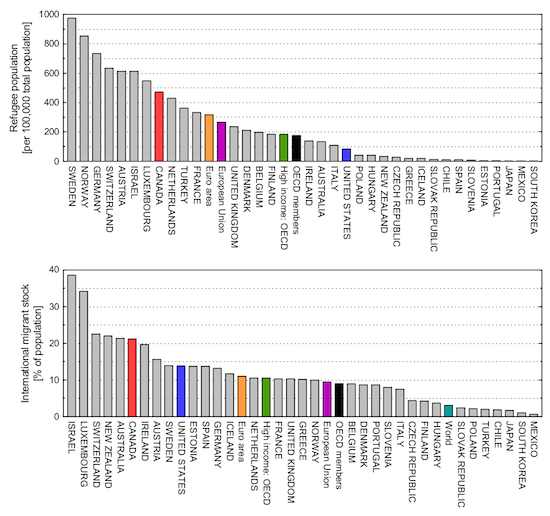In his latest essay at the Canadian Broadcasting Corporation, Michael Enright puts forth a view of Canada's recent immigration and refugee policies that is not consistent with the international datasets:
“Most things about this country have changed since the mid-fifties. What has changed profoundly is Canada's attitude toward refugees. Instead of being the open, welcoming nation we once were, we have become pinched, fearful, meaner. We have become a bit smaller ... Every one of us, except the indigenous first owners of the land, have come from somewhere else, either as refugees or immigrants.”
Some illumination with the facts are in order for representatives of this public broadcaster.
Using data from the World Bank, the following charts show Canada's ranking relative to other members of the OECD when it comes to the proportion of the population that is refugees and the total international migrant stock (number of people born in a country other than that in which they live, including refugees) within each nation.

It is clear that Canada is, and has been, far more generous with regard to accepting refugees and other immigrants than almost all other members of the OECD. Our generosity is probably excessive.
Our current refugee population in relative terms is 50 percent higher than the Euro area, almost 80 percent higher than in the European Union, twice the size of the UK, 160 percent higher than the high income OECD average, 170 percent higher than the OECD average, nearly six times larger than the United States, more than 230-fold larger than Japan's, and almost 500 times as large as in South Korea.
Since the Conservative Party under Stephen Harper was elected in 2006, Canada's total refugee population has increased 11.3 percent
Since the Conservative Party under Stephen Harper was elected in 2006, Canada's total refugee population has increased 11.3 percent. Not generous? Hardly. Overly generous is more likely the accurate characterization. During this same time frame, Australia's refugee population declined 54 percent, the Euro area only increased 1.2 percent, the EU declined by over 10 percent, the UK declined 51 percent, the USA declined 31 percent, the OECD average only went up 0.9 percent, and the high-income OECD average decreased by 11 percent.
Rapid refugee settlement can been socio-economically and politically disruptive to a country. Canada needs to take a more cautious approach towards accepting refugees. We already have far more refugees than the vast majority of wealthy nations, and we continue to bring them in at rates exceeding almost all other developed countries.
Canada's immigration policies have also become too lax. We already have one of the highest international migrant stocks among the OECD. More than 21 percent of the population was born outside Canada. Compare that to less than 14 percent in the United States, 11 percent in the Euro area, a little over 10 percent among high-income OECD members, 10 percent in the UK and France (where societal disruption from immigration is rampant), only 9 percent for both the EU and OECD averages, 3 percent globally, below 2 percent in Japan, and at one percent in South Korea.
Canada needs a multi-decadal time out on large-scale immigration, including refugees
Between 1965 -- when the World Bank database begins -- and 1990, Canada's international migrant stock didn't change at all. Since 1990, it has increased from 16.2 percent of the population to over 21 percent, with the most rapid increase taking place between 2005 and 2010 (19.5 to 21.2 percent). Canada has become a “pinched, fearful, meaner” country and “a bit smaller”? Nonsense. The data shows the opposite.
Mexico's international migrant stock is at 0.6 percent, 35-fold lower than Canada. Far from being inclusive,
Mexico is the most xenophobic nation among the OECD -- and yet this budding narco-state presumes to lecture the USA and Canada on its immigration policies?
Canada needs a multi-decadal time out on large-scale immigration, including refugees. The current crop will need to be assimilated in a melting pot model, not a multicultural model, and this requires patience. For the foreseeable future, many international refugees will have to find other settlement options, or preferably, seek means of affecting the desired change in their homelands so they do not require resettlement elsewhere.
 It is clear that Canada is, and has been, far more generous with regard to accepting refugees and other immigrants than almost all other members of the OECD. Our generosity is probably excessive.
Our current refugee population in relative terms is 50 percent higher than the Euro area, almost 80 percent higher than in the European Union, twice the size of the UK, 160 percent higher than the high income OECD average, 170 percent higher than the OECD average, nearly six times larger than the United States, more than 230-fold larger than Japan's, and almost 500 times as large as in South Korea.
It is clear that Canada is, and has been, far more generous with regard to accepting refugees and other immigrants than almost all other members of the OECD. Our generosity is probably excessive.
Our current refugee population in relative terms is 50 percent higher than the Euro area, almost 80 percent higher than in the European Union, twice the size of the UK, 160 percent higher than the high income OECD average, 170 percent higher than the OECD average, nearly six times larger than the United States, more than 230-fold larger than Japan's, and almost 500 times as large as in South Korea.